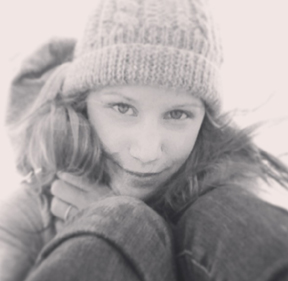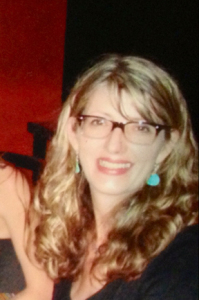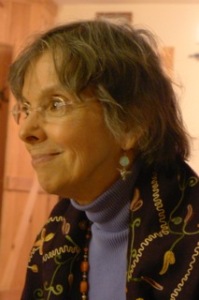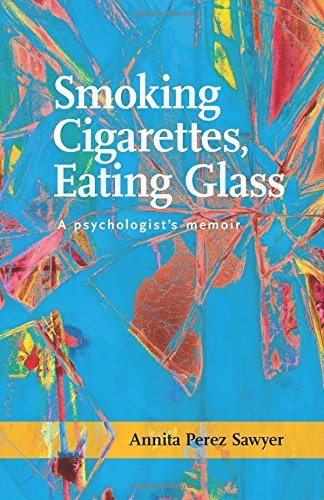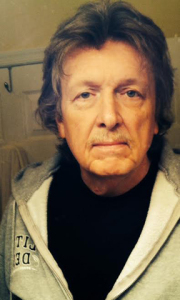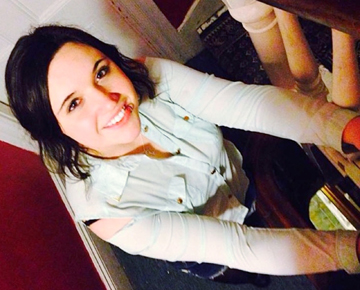
R.G. Chandler interviewed Matthew S. Rosin about his flash fiction story “Hope,” which appears in the Winter 2015 edition of r.kv.r.y. quarterly. Rosin and Chandler met when they worked for the same education non-profit. They eventually got to know each other as creative writers and are now part of the same writing group.
Chandler: “Hope” is a powerful story. After reading it, I had to wonder: where did the story originate? The metaphor of the sand and the bucket is so vivid and so alive that it must have a back story.
Rosin: “Hope” is the story of someone seeking treatment for mental illness: depression, anxiety, what have you. I’ve dealt with these challenges — first depression, and more recently anxiety — for all of my adult life.
The story sparked one morning while I was driving. I had just dropped off my child at daycare and was heading to my favorite coffee shop to write. It had been a rough morning, and my anxiety level was still rising. Fast.
Then, while stopped at a traffic light, I suddenly noticed my body. I was hunched forward at the steering wheel, my neck crooked, as if struggling to hold up a weight.
In that moment, through stepping apart from the sensation and trying to understand it, the energy that had fueled my anxiety made a sort of creative pivot. By the time I got to the coffee shop, the sand and funnel imagery that became “Hope” were calling me to write. Two hours later, I had a relatively tight first draft.
I think that’s why the story packs a punch: it contains the urgency of a man writing his way out of an anxiety attack.
The details in the story are fiction. But the metaphors and the phenomenology all came from my noticing and trying to express in words what anxiety was doing to my body.
Chandler: What made you chose to write “Hope” in a second person point of view? Did you start off writing the story in second person, or was that something you shifted to?
Rosin: I did it intuitively from the outset. But the second-person point of view stuck around through all the revisions because, when combined with the imagery, I think it pushes the reader to find solidarity with the protagonist.
For example, my goal with the opening lines was to place the protagonist’s burden — the weight, the need to make sense of what’s happening and find some kind of equilibrium — immediately upon the reader.
Chandler: There are lines in “Hope” that I find fascinating because of the word choices you made, such as: “The doctor does not wear a white coat, but all the possible names for your struggle listen on a shelf behind her, inside a book as heavy as the sand in your skull.” What made you choose the word “listen?”
Rosin: The book in question is the Diagnostic and Statistical Manual of Mental Disorders, or DSM, which is the manual that mental health providers use to categorize mental illness. It gets revised periodically, and the boundaries between old and new disorder categories — and between disorder and the ordinary difficulties of everyday life — shift around. Those shifts have consequences for people’s lives.
I described the DSM as “listening” because it’s not an inert tome on the shelf. By entering a psychiatrist’s office and asking for help, the protagonist’s troubles will be absorbed into a set of categories for making sense of mental struggle. Insurance payments and, in the case of the story, medication that might help will follow.
I’m not criticizing this, by the way. My own life is more livable for it. Diagnostic categories, whatever their truth, bring a language for making sense of your struggles. You can move beyond your inchoate fear of going crazy. With help, you can learn to objectify what’s happening to you, recognize its movements and moments within you, and act in the world to counter it.
Chandler: Every single word in “Hope” seems to have been specifically and carefully chosen. It doesn’t feel like you dropped any word in by accident. So again, in reference to the previously-quoted line, you write that “the doctor does not wear a white coat.” Then, when you describe the pharmacist a few short lines later, you state: “the man wears a white coat, but he is not a doctor.” What’s the deeper meaning behind this contrast? What’s the significance of the white coat?
Rosin: One thing I wanted to show through the story is how new hope sometimes takes its first breath in response to small things vested with symbolic weight. Like the couch in a doctor’s office. Finding a name for your struggle. A pharmacist’s white coat. Mapping out future events in your cell phone’s calendar. Little capsules and pills.
Only a few days ago, I was picking up a prescription at my pharmacy, and the woman behind the counter wasn’t wearing a white coat. I’d seen her in the store before, so I wasn’t totally put off by it. But still, I felt slightly anxious until she reached for her white coat and slipped it on. I guess she’d just arrived at work or returned from a break. Somehow, that coat transformed my perception. It affirmed my trust in her.
But I don’t think I’d want to walk into a psychiatrist’s office and be welcomed by a white coat, despite the fact that white coats symbolize all the responsibilities and trust we grant doctors in our culture. You’re there to treat your body, sure, but it’s not a room for physical examination in the usual sense. It’s more intimate than that. It’s a place to tell ever-truer stories about your vulnerabilities, wrestle with them, and plan new responses. You’re there to prepare your spirit for the road ahead.
My own feeling is I’d rather the symbols of medical authority — the diplomas, the DSM — hold up the walls and the shelves. Then, in the space they hold open, I can take the risk to spill some of my sand before another person — one who listens and helps interpret the patterns on the floor.
Chandler: Your style of writing mimics that of a poet. “Hope” seems more “linear” in nature, compared with the longer paragraphs usually found in prose. Also, it distinctly follows Coleridge’s description of poetry: the right words in the right order, with each line building on the line before. You’re very good at leading up to and then packing a powerful punch into very few words, such as: “Like dad did.” Considering this, I have to wonder: what is your poetry background? What other forms of writing do you engage in?
Rosin: Poetry is important for how I think about writing fiction, especially flash fiction.
My dad, Gary S. Rosin, is a poet. He’s long been active in the Texas poetry community. As a kid, I attended his poetry readings — at least the ones before bedtime — and proudly put a copy of his first chapbook on my bookshelf. Now, my dad and I talk about writing all the time, and he’s been steadfast in supporting my turn to fiction.
One thing I got from my dad and his poetry readings, I think, is a feeling that written language wants to be spoken. That feeling also comes from my being a songwriter and musician. Most of my own poetry is used as lyrics, which means I’m always concerned with the sound, rhythm, flow, and cadence of the words I write.
When I revise a piece of fiction, the process always includes reading aloud. If I trip over a sentence, or if it feels awkward on my tongue, I rewrite. I tweak the placement of paragraph breaks with speech in mind, too. In the case of “Hope,” that meant short, spare paragraphs.
My dealings with poetry and songwriting have also given me a desire to pack the most power into the fewest words, with the right image at the right moment. I aspire to that, anyway. Flash fiction is a great context for that because you’ve only a limited amount of real estate to get your point across. The words need to cut, bloom, explode.
Chandler: I know that you were previously an education writer. How does nonfiction writing differ from fiction for you personally? Was this a difficult shift, or do both of these writing personae come naturally to you?
Rosin: The audiences and their goals differ. So do the means by which you interrogate reality: creative use of metaphor only goes so far in an education policy document before data and charts come calling.
But my transition from nonfiction to fiction has gone smoothly, on the whole. Ultimately, the goal in both contexts is to tell a worthwhile story well and invite your readers to wrestle with ideas and themselves — and to become the kind of writer who can pull it off. That’s the common calling.
Chandler: I really enjoyed “Hope” and other pieces of yours that I’ve read. If someone wanted to read more of your work, where could she find it? What can we expect from you in the future?
Rosin: “Hope” is my first published piece of short fiction; other stories will hopefully appear in the future. In the meantime, I will publish a novelette — a fable called The Honeydrop Tree — this year. And I publish periodic “Reflections On Fatherhood” podcasts and other writings via my website, www.matthewsrosin.com. I welcome everyone to visit, read, and listen!
* * * * *
R.G. Chandler is a Bay Area, California writer and poet. She has been described as “the voice from the curb” because her words turn the forgotten — the homeless, the alcoholics, the drug addicts, those who suffer mental illness — into real human beings. Chandler has published a novel (Surviving Xcarion) and several poems and short stories, and she has three screenplays out for consideration. You can find her on Facebook.
Photo of Matthew S. Rosin by Todd Rafalovich.

